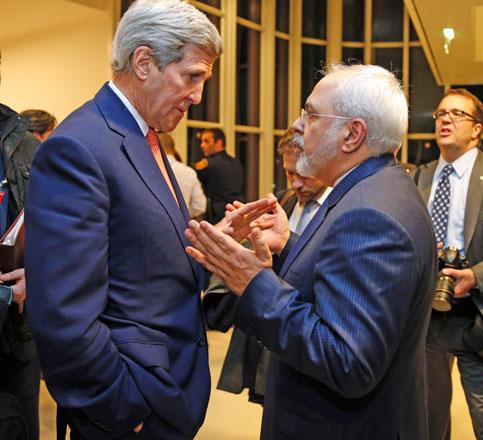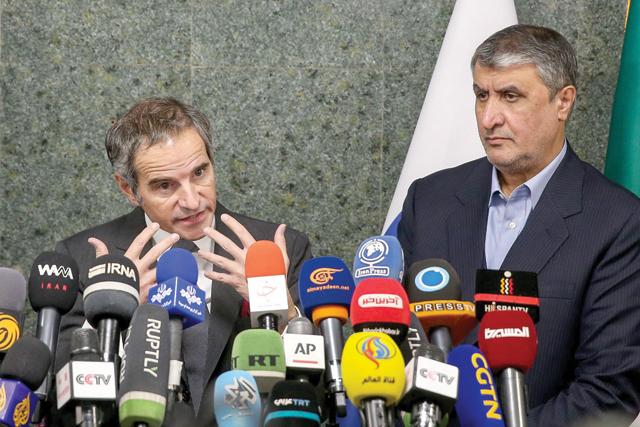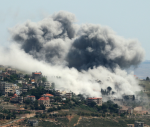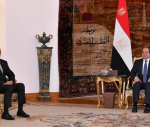You are here
Iran nuclear talks extended 7 months after failing to meet deadline
By Reuters - Nov 24,2014 - Last updated at Nov 24,2014
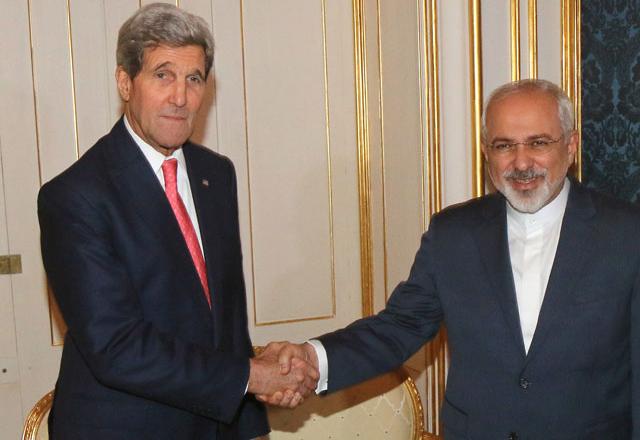
VIENNA — Iran and six powers failed on Monday for a second time this year to resolve their 12-year dispute over Tehran's nuclear ambitions, and gave themselves seven more months to overcome the deadlock that has prevented an historic deal.
Western officials said they were aiming to secure an agreement on the substance of a final accord by March but that more time would be needed to reach a consensus on the all-important technical details.
Iranian President Hassan Rouhani, who is trying to win relief from crippling international economic sanctions by patching up relations with the West, said that "many gaps were narrowed and our positions with the other side got closer" at talks in Vienna, state TV quoted him as saying.
US Secretary of State John Kerry gave a more sombre assessment, saying "real and substantial progress had been made” but adding that "some significant points of disagreement" remained.
"These talks are not going to get easier just because we extend them. They're tough. They've been tough. And they're going to stay tough," he told reporters.
Under an interim deal reached by the six powers and Iran a year ago in Geneva, Tehran halted higher level uranium enrichment in exchange for a limited easing of the financial and trade sanctions which have badly hurt its economy, including access to some frozen oil revenues abroad.
Monday marked the second self-imposed deadline for a final settlement to have passed without any deal. "We have had to conclude it is not possible to get to an agreement by the deadline that was set," British Foreign Secretary Philip Hammond told reporters, adding that the target date had been extended to June 30, 2015.
Tehran dismisses Western fears that its nuclear programme might have military aims, saying it is entirely peaceful. However, the six powers - the United States, France, Germany, Russia, China and Britain — want to cut back Iran's uranium enrichment programme to lengthen the time it would need to build a bomb.
Pressure at home
Rouhani said he had no doubt there would be an agreement eventually. An unashamed pragmatist, he won election by a landslide last year on promises to work to end Iran's international isolation.
But he made clear that Tehran was taking a tough line at the talks. "There is no question the nuclear technology and facilities of the Islamic Republic of Iran will remain active and today the negotiating sides know that pressure and sanctions against Iran were futile," he told state TV.
Rouhani faces heavy pressure from hardline conservatives at home who have already blocked his drive to ease restrictions on Iranians' individual freedom.
The administration of President Barack Obama must also overcome strong domestic misgivings.
Three influential US Republican senators said the extension should be coupled with increased sanctions and a requirement that any final agreement be sent to Congress for approval. The three — John McCain, Lindsey Graham and Kelly Ayotte — said in a statement that a "bad deal" with Iran would start a nuclear arms race in the Middle East.
But Kerry defended the decision not to abandon the talks. "We would be fools," he said, raising his voice, "to walk away from a situation where the breakout time [for Iran to develop a nuclear weapon] has already been expanded rather than narrowed, and the world is safer because this programme is in place."
Headline agreement
Hammond said the expectation was that Iran would continue to refrain from sensitive atomic activity. There was a clear target to reach a "headline agreement" of substance within the next three months and talks would resume next month, he said.
It is unclear where next month's talks will take place, he said, noting that during the extension period, Tehran will be able to continue to access around $700 million per month in sanctions relief.
A report by the International Atomic Energy Agency, the UN nuclear watchdog, showed that Iran had reduced its stockpile of low-enriched uranium gas and taken other action to comply with last year's interim agreement with world powers.
No details about the "substantial progress" were immediately available. One senior Western diplomat expressed pessimism about the prospects for an agreement in seven months time.
"It's been 10 years that proposals and ideas have been put forward," he said on condition of anonymity. "There's nothing left. It's essentially a side issue now. The Iranians are not moving. It is a political choice."
The Vienna talks have aimed for a deal that could transform the Middle East, open the door to ending economic sanctions on Iran and start to bring a nation of 76 million people in from the cold after decades of hostility with the West.
The cost of failure could be high, and Iran's regional foes Israel and Saudi Arabia are watching nervously. Both fear a weak deal that fails to curtail Tehran's nuclear ambitions, while a collapse of the negotiations would encourage Iran to become a threshold nuclear weapon state, something Israel has said it would never allow.
As it appeared likely that no agreement was in the offing, Israeli Prime Minister Benjamin Netanyahu said: "No deal is better than a bad deal."
Related Articles
Iran, the United States and other world powers are all but certain to miss Monday's deadline for negotiations to resolve a 12-year stand-off over Tehran's atomic ambitions, forcing them to seek an extension, sources say.
TEHRAN — The US and Iranian presidents on Sunday hailed the implementation of Tehran's nuclear deal as historic, but new American sanctions
TEHRAN — Iran said Monday it was awaiting "details" on Russia's demands for US guarantees that could potentially delay reaching an agreement


